ACCOUNT
2022
Shifting from







2022
Shifting from







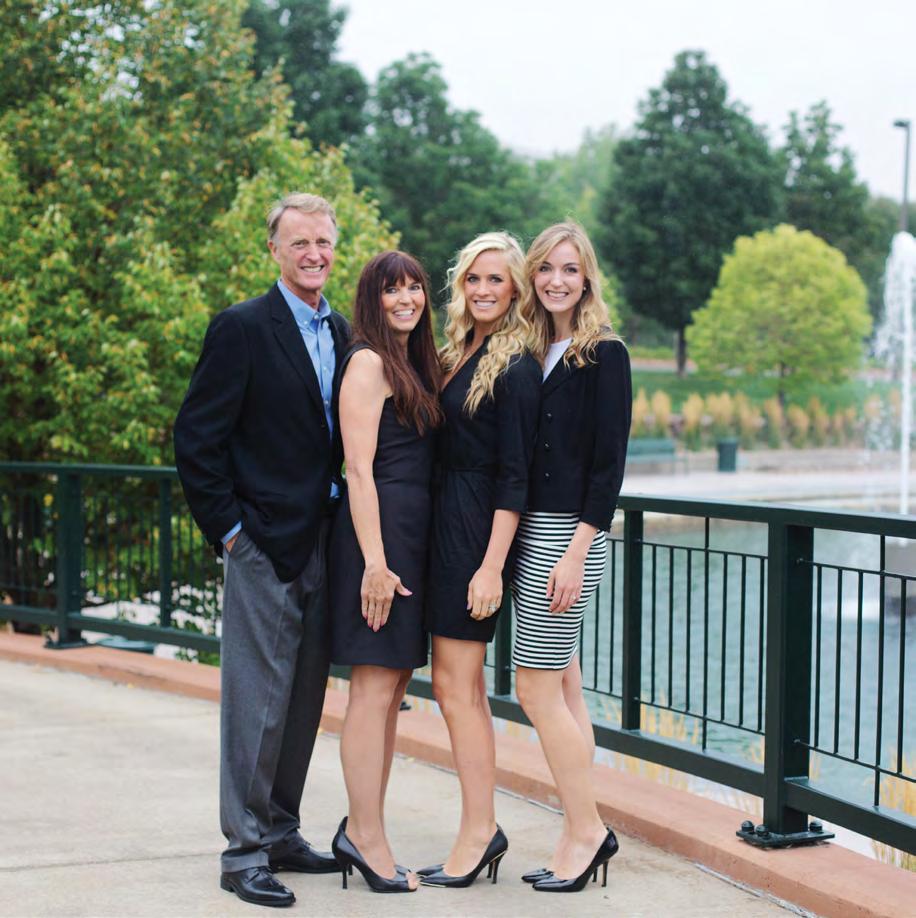

The search is over. Alicia Gelinas, CPA, succeeds Mary E. Medley as COCPA CEO, effective Sept. 9, 2022.
On Aug. 26, the COCPA honored seven women - three Leaders of Note and four Emerging Leaders - for their significant contributions to the profession and their communities.
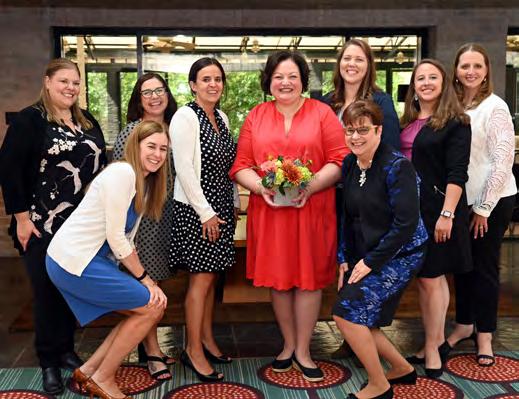
Dr. Sorensen was known not just for his teaching career but also for his pioneering research and contributions to management accounting education over the course of 52 years.

In 2021, Colorado became the first state in the U.S. to require employers to disclose compensation in public job postings. Intended to combat pay discrimination, the requirements have had unintended consequences.
When drafting or reviewing a business continuity plan, it’s always important to consider your IT services partner and how it can help strengthen your plan and ensure your team can function without interruption.

When scooter-sharing came to market in 2017, the service was supposed to be one solution to “last mile commuting” - covering the distance between your office and wherever public transportation drops you off. It hasn’t played out that way. Several Colorado cities are launching official programs to make these transportation options safer and more accessible to all.

A bimonthly publication of the Colorado Society of Certified Public Accountants Vol. 68, No. 2 September/October 2022
Angela Roberts, Chair Diego J. Baca, Vice Chair Amy E. King, Treasurer Randy L. Watkins, Immediate Past Chair Alicia Gelinas, Secretary
Jim Gilbert, Ronald L. Goodrich, David Loucks, Amy King, Heidi M. O’Neil, Alexandria A. Romero, Tiffany Davis
Jack Allgood, Ken Fichter, Lori Anne Reinwald, Laura J. Theiss, Barbara J. Tedesko, Steve Van Meter, Michael D. West, Charlie Wright
Mary E. Medley, Editor
Natalie G. Rooney, Contributing Writer Sarah Knight, Blue Ocean Ideas, Design
NewsAccount (ISSN #10899952) is published bimonthly by the Colorado Society of Certified Public Accountants, 7887 E. Belleview Ave., Suite 200, Englewood, CO 80111. NewsAccount is published in January, March, May, July, September, and November and reports information, news, and trends in the accounting profession. The Colorado Society of CPAs assumes no liability for readers’ business decisions in reference to advertisements or other information included in this publication.
Membership dues include a $14.00 one-year subscription to NewsAccount Periodical postage paid in Englewood, CO, and additional mailing offices.
POSTMASTER: Send address changes to NewsAccount, Colorado Society of Certified Public Accountants 7887 E. Belleview Ave., Suite 200 Englewood, CO 80111
Net press run = 5,447 copies; sales through dealers and carriers, street vendors, and counter sales = 0; paid or requested mail subscription = 5,407; free distribution by mail = 0; free distribution outside the mail = 20; total free distribution = 20; total distribution = 5,427; office use, leftovers, spoiled = 19; returns from news agents = 0; total sum = 5,447; percent paid and/or requested circulation = 99%. 303-773-2877 • 800-523-9082 Fax: 303-773-6344
and characteristics which became the focus beyond the formal job description to identify qualified, exceptional candidates. The top six qualities and priorities were:
• Organization awareness and vision
• Communications
• Strategic thinking
• Integrity
• Advocacy - being a voice for CPAs
• Judgment and critical thinking
NewsAccount is available online at www.cocpa.org
The COCPA Board of Directors named Alicia Gelinas, CPA, President and CEO of the Colorado Society of CPAs, effective Sept. 9, 2022. Gelinas was selected following an extensive, nationwide search conducted by the COCPA Board of Direc tors-chartered CEO Search Committee.
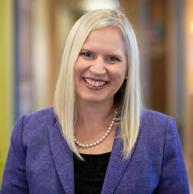
The Board approved the search committee’s charter on Feb. 25, and the following mem bers were named: Committee Chair Randy Watkins, CPA, CGMA, CCIFP, BDO LLP, Greeley, and immediate past Board chair; Committee Co-chair and current COCPA Chair Angela Roberts, CPA, Aclivity, LLP, Denver; former Board member Toby Clary, CPA, Soukup Bush & Associates, CPAs, Fort Collins; past Board chairs Victor Amaya, CPA, Aurora, and Tawnya Ramirez,CPA, Elucidate Financial Services, LLC, Aurora; and Board Community Member Amy King, MSP, MEDI Leadership, Denver.
From five search firm proposals, the committee chose Evergreen Executive Source, LLC, to support it in conducting the search. The BoardSource Chief Executive Transitions guide served as the model for determining the critical core competencies
The vacancy announcement was published on April 21. From April through June, the search consultants interviewed COCPA members, six past chairs, committee mem bers, and COCPA staff members. Also, they reached out to other state CPA societies, the American Institute of CPAs, profes sional nonprofit organizations, and prom inent Colorado executives and leaders for candidate referrals and recommendations. After an extensive application process involving more than 37 individuals, six candidates were selected for presentation to the search committee.
The search committee unanimously selected Gelinas for recommendation to the Board of Directors, whose members also unanimously agreed and endorsed her selection with a resolution naming Gelinas as President and CEO.
Watkins expressed his appreciation for the committee’s work. “The committee’s ded ication and commitment to represent the COCPA membership was outstanding,” he said. “The caliber of candidates was com petitive, and Evergreen Executive Search did an excellent job for the Society.”
In accepting the position, Gelinas said, “Like many of our 6,000+ members, the COCPA has been a beacon in navigating my career as a Colorado CPA. I am honored to be given the opportunity to engage our members and team to build upon the solid
foundation established over the last 118 years to ensure the COCPA continues to be the professional home for accounting profession als. Colorado communities depend on the accounting profession, which is why I am fueled every day by the COCPA’s passion to help people thrive professionally and person ally through service and connection.”
On Sept. 11, Gelinas celebrated five years with the COCPA as Chief Financial Officer and Executive Director of the Educational Foundation of COCPA. She joined the Society originally in 2002 as a student member while attending the University of Denver Daniels College of Business where she graduated magna cum laude with a Masters of Accoun tancy and Bachelor’s of Science in Accounting. This proud DU alumna also is a graduate of the AICPA Leadership Academy. After launching her career in audit with Ernst & Young LLP, Denver, Gelinas gained additional valuable experience in adjunct teaching, small business accounting, consulting, coaching, and nonprofit management. She received her Certified Coach designation from the Hudson Institute of Coaching and is an Associate Certified Coach through the International Coaching Federation.
Alicia and Roland Gelinas love being near the water, on the water, and in the water. Here they are enjoying Barefoot Lakes, Firestone, Colo.
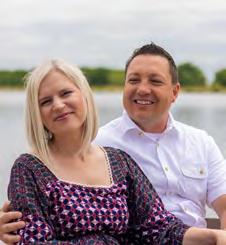
Gelinas has served the COCPA in multiple volunteer capacities, including:

• 2009-2011: Member, Board of Directors and Audit Committee
• 2009-2012: Chair, Young Professionals Committee
• 2012-2016: Trustee and Vice President, Educational Foundation of COCPA Board of Trustees

She received the COCPA 2011 Everyday Hero ine Award for her community service work. Gelinas’s AICPA activities include:


• 2011: Vice Chair, Young CPA Committee
• 2011-2014: Graduate, mentor, and alumni representative, Leadership Academy
• 2013-2014: Member, Future of Learning Task Force
In announcing the news, Angela Roberts said, “The very programs the COCPA and AICPA create to identify and develop amazing lead ers like Alicia are the programs our members support every day. Alicia is the perfect model and representation of these programs. Her credentials and accomplishments make her uniquely qualified to lead the COCPA. Her 20 years of expertise and leadership in the profession will be invaluable for innovating the future of our profession. She is the right leader at the right time, and we are fortunate to welcome Alicia to this new role.”
Join us in congratulating Alicia Gelinas as President and CEO. You may contact her at alicia@cocpa.org. Also, look forward to the November/December 2022 NewsAccount in which you’ll learn more about her plans for the COCPA going forward.





her, she would surprise me by asking about something I had going on at work or in my personal life that she remembered or was interested in. I have never known anyone like her.”
COCPA and the accounting profession, but also made everyone she met in the process better, just by knowing her,” Alicia writes.
In their book, The Leadership Challenge, James Kouzes and Barry Posner write, “Leadership is not an affair of the head.
Leadership is an affair of the heart.” Few leaders have served their constituents, shaped their professions, or elevated their organizations with more heart than Mary E. Medley, who on Sept. 9, 2022, retired as COCPA President and CEO following 48 years with the organization – 30 of which were spent at its helm.

Mary joined the Society in September 1974. After holding positions in member services, public relations, CPE, as assistant executive director, and as executive director of the Educational Foundation of the COCPA, she became executive director (later President and CEO) on Jan. 1, 1992.
Over the years, countless COCPA mem bers, colleagues, community members, and others have benefited from Mary’s vast knowledge, deep dedication, passion for serving others, commitment to going the extra mile, and – did we mention – her warm and caring heart.
No matter how large the stage or the stakes – whether speaking to a national audience in support of initiatives that impact the profes sion, working with the Colorado State Board of Accountancy, or mobilizing resources to advocate for Colorado CPAs and those they serve at the State Capitol – it’s people and relationships that energize Mary.
Past Board Treasurer Peter Derschang, CPA, writes that “Mary has a unique gift for connecting with people. When I would see
Past COCPA Chair (called “President” at the time) Tom Kundinger, Retired CPA, writes that Mary has "had a major impact on the CPA profession and an even greater impact on the individuals in the profession." He calls his year as president one of the most enjoyable experiences of his career, adding that "I still have a keepsake from our visit to Cañon City [during the Chair Tour]: a souvenir ballpoint pen from the Royal Gorge Bridge, a gift from Mary that I have kept for 28 years, despite the fact that the ink ran dry 27 years ago.”
Mary’s passion for the profession is not only deep but also contagious, with her enthu siasm easily spreading to those who know and are inspired by her. Vice Chair/Chairelect Diego Baca, CPA, writes, “In the time I’ve known Mary, hearing her speak about the profession has made me realize how thankful I am to be a CPA. I’ve worked with a lot of CPAs in my career, but Mary’s zeal and love for the profession are unmatched. It’s that passion that has kept me engaged through the years, and I hope to help instill the same zeal and passion in others that she’s brought to me.”
Her contributions on a “smaller stage” – one on one – are equally meaningful. Alicia Gelinas, CPA, who recently assumed the role of President and CEO following Mary’s retirement, first met Mary when she was a student in Mary’s business writing class at the University of Denver. Alicia considers her a mentor, role model, “and most impor tantly, a friend.”
“Mary has been a leader and visionary who not only shaped the cornerstones of the
COCPA Chief Operating Officer/Chief Learn ing Officer Rebecca Campbell, CAE, who worked with Mary for 33 years, is inspired by Mary’s unwavering focus on member service. “Every day, Mary lived out the COCPA Core Value, ‘We are member/people focused,’” Rebecca writes. “She came to work determined to make a difference for the accounting profession, members, and staff, often in unexpected ways.”
Reflecting on Mary’s impact on so many, COCPA Chair Angela Roberts, CPA, writes, “Mary is, hands down, the most phenome nal woman and leader I have ever met. She has mentored thousands of CPAs across the country with superb guidance and amazing support. Thank you, Mary, for always being there and for your undying commitment to the profession.”
Pamela Galey-Coleman, COCPA Member Ser vices Representative, shares her good wishes for Mary’s next adventure. “Thank you, Mary, for being you,” Pamela writes. “I am confident that your motto, ‘More to come,’ will carry over into your retirement life and that your future happiness, health, joy, faith, hope, and love will abound. May your cup always runneth over.”
Whether speaking in front of hundreds of her colleagues on a national stage or helping a member navigate a complicated licensing issue, Mary immeasurably impacted the profession, the COCPA, and its people. We thank her for her commitment, passion, and tireless energy, and we wish her great adven tures ahead with her husband, Bob Cloud. We can’t wait to see what her future holds and who will next be blessed by her gifts.

This past summer, COCPA Chair of the Board Angela Roberts, CPA, Member and Business Development Director Derrol Moorhead, and COCPA CEO Mary E. Medley took to the road once again for member visits across Colorado. At every stop, we were reminded of how special the profession is, how meaningful it is to gather in person, and how beautiful our state is.
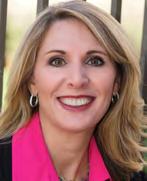



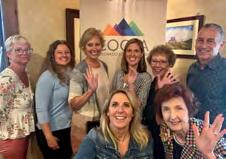

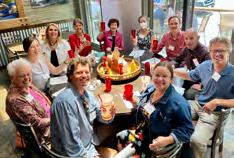
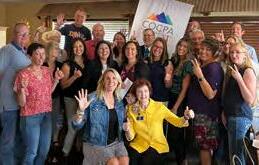
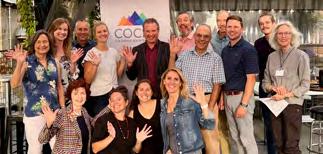
 BY KELLI DAVIS
BY KELLI DAVIS
On August 26, in collaboration with the AICPA, the COCPA honored the following individuals with the 2022 Women to Watch Award. Leaders of Note have attained leadership positions within their organizations, made notable contributions to the accounting profession, helped improve their workplaces, and mentored others. Emerging Leaders have demonstrated leadership and have made significant contributions to the profession and their communities, while on the path to the highest levels of advancement. We congratulate them on their achievements and look forward to watching them soar.

Amid the myriad responsibilities Sarah Jackson, CPA, juggles as a leader within CBIZ’s Colorado advisory practice, she makes time to mentor and support others, including firm asso ciates at varying levels and women in the community who come from disadvantaged circumstances.
In nominating Sarah as a Leader of Note, CBIZ Senior Managing Director Dan Seff, CPA, CVA, notes, “As a career advocate, Sarah searches for areas of improvement within [associates’] roles so they will be prepared and successful in pursuing promotional opportunities. In the past year, she has mentored and onboarded more than 10 new hires and helped them assimilate into the firm culture and ensure their success within their new work environment.”
Caitlyn O’Neil, CPA, CBIZ Senior Tax Asso ciate, knows the benefits of Sarah’s gift for mentoring young professionals. She writes that Sarah “provided me with the tools, resources, and guidance I needed to ensure that I was on the right path to success.”
Acknowledging that Sarah has plenty of other tasks on her plate, O’Neil continues, “Sarah is one of the most respected mem bers of our team. Her responsibilities are extensive, yet she will always make time for
her colleagues. She is a confidante, advocate, mentor, and leader in the firm.”
On a larger scale, Sarah brought the CBIZ Women’s Advantage (CWA) program to the Denver office and sits on the national CWA Board. CWA provides training, development, mentorship, recognition, and career enhancement to women profes sionals within CBIZ. She brings these same elements to women in various business communities via educational and network ing events. As someone who never misses an opportunity to help women thrive both
for donation to 45 Dress For Success (DFS) affiliates nationwide. Its mission is to empower women to achieve economic inde pendence by providing professional attire and development tools.
Locally, Sarah serves on the board of Warren Village, a nonprofit organization assist ing low-income, single-parent families in achieving economic self sufficiency. She leverages her financial expertise by contrib uting fresh fundraising and development ideas. In the last year she has shifted her participation to focus on business devel
within the firm and in the larger commu nity, Sarah regularly hosts networking and philanthropic events geared toward bringing women together.
Seff notes that in 2021, Jackson teamed with other national CWA Board members to organize a virtual Your Hour, Her Power Campaign. The effort was CWA’s most suc cessful to date, yielding more than $83,000
opment and reconstructing events within pandemic protocols.
Within both the profession and her local community, Sarah is making long-lasting contributions. O’Neil writes, “I will be forever grateful that my career path crossed with Sarah’s, as her support has been instru mental to my success.” We know many others would say the same.
LEADER OF NOTE Sarah Jackson, CPA Managing Director, CBIZ MHM, Denver
“Within both the profession and her local community, Sarah is making long-lasting contributions.”
Denver Audit Partner in Charge, KPMG LLP, Denver
When you meet Leader of Note
Meredith Kuehler, CPA, you immediately sense her enthu siasm, passion, and energy for her firm, clients, and colleagues, writes nominator
Mike Bearup, CPA, former Managing Partner of KPMG’s Denver office, where Meredith is Partner in Charge of the Denver Business Unit’s audit practice. He notes that Meredith “is recognized by the firm’s partners, col leagues, and clients as an outstanding leader and trusted business advisor.”
As a business unit leader, Meredith is respon sible for building a dynamic, collaborative culture for more than 300 professionals in four offices. Under her leadership, the Denver Business Unit has earned a reputation for innovation and inclusivity, exemplifying KPMG’s core values of Integrity, Excellence, Courage, Together, and For Better.
Meredith is committed to building a diverse and inclusive culture within KPMG. She serves as Co-Chair of the Membership and Engagement Committee for the firm’s PRIDE@KPMG Business Resource Group.
She previously served for seven years as the Denver Business Unit’s Human Resource and Resource Management partner cham pion, where she played a key role in employee retention and development.
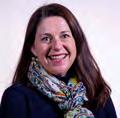

Meredith has worked with clients of all sizes and development stages in the mining, oil and gas, and aggregate industries, as well as in the consumer products and manufacturing industries. She is active in KPMG’s mining practice, collaborating throughout the United States and around the globe to share industry knowledge and best practices across the audit, tax, and advisory functions. She contributes to the development and delivery of industry-
specific training in the Denver office, and helps to organize KPMG Denver’s Energy Share Forum events. In 2016, the Denver Business Journal named Meredith to its Top Women in Energy list.
Alongside the demands of her career, Mer edith exemplifies the core KPMG values of mentorship and service. She actively participates in mentoring activities within the firm, thus contributing to a positive, collaborative culture, and gives back to the community through her service to profes sional associations and nonprofit organiza tions. For example, she currently serves as Co-Chair of the Colorado Chapter of Women Corporate Directors.
Bearup writes, “Meredith exemplifies the leadership, professionalism, character, and commitment needed to succeed in KPMG’s high-performance culture. She has a strong track record of success and continually strives for higher levels of achievement.”
He continues that Meredith’s “proven competence, strong work ethic, record of accomplishment, and personal interest in helping others succeed” make her a true Leader of Note. We couldn’t agree more.
Professor of Accounting, Colorado Mesa University, Davis School of Business, Grand Junction
To say that Suzanne Owens-Ott, CPA, Professor of Accounting at Colorado Mesa University’s Davis School of Business, is admired by her students is an understatement. She has the student evalua tion scores to prove it. She’s earned a perfect 5.0 median-of-median score in nearly every class that she’s taught, in every semester.
“Dr. Owens-Ott is one of the best professors on this campus,” writes one student. “She combines the textbook materials with her real-life auditing experience to give students a great education.” Another writes, “Pro fessor Owens-Ott makes it a point to get to know her students. She wants the best for her students, and it shows.”
“Suzanne’s students absolutely love and respect her,” confirms Christine Noel, CPA, PhD, a Colorado Mesa colleague and a 2016 Women to Watch Leader of Note. “She truly
cares about her students and the education they receive in her classes.”
Suzanne joined Colorado Mesa as a faculty member in 2006 following stints in both public accounting and industry - experi ences that allow her to bring real-world perspectives to the classroom. Also of note is Suzanne's innovative classroom style. Noel writes, “She flips her classroom, integrates the current accounting profession into her curriculum, and works to improve her classes over time.”
Suzanne earned her Doctorate of Business Administration from California Southern University in 2019, while also teaching full time. Notes Noel, “She, like a true teach er-scholar, incorporates her scholarship into her teaching, and vice versa.”
Suzanne’s commitment to students extends to her passion for helping them find success
in their early careers following graduation. She always can be counted on to partici pate in student advisement events and stays connected with the profession in order to provide relevant career advice.
Equally deep is Suzanne’s commitment to her university and to the accounting profession. She serves as a mentor to junior faculty in her department and has par ticipated on countless committees at the departmental and university level, often in leadership roles.
Beyond the halls of Colorado Mesa, Suzanne currently serves as Chair of the Colorado State Board of Accountancy, having been appointed by Gov. Jared Polis in 2020. She previously served on the Grand Junction Regional Airport Authority Audit and Finance Committee. Colorado Mesa students aren’t the only future leaders who have ben efitted from Suzanne’s dedication: She also is a past Girl Scout troop leader.
We celebrate Dr. Suzanne Owens-Ott for her commitment to her students and the future of the profession.
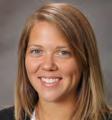
Partner, State and Local Tax Services, RubinBrown, LLP, Denver
Quiet leadership, technical acuity, and a deep commitment to client service define Emerging Leader
Ashley Granger, CPA, according to nomina tor Rhonda Sparlin, CPA, Partner in Charge, State and Local Tax, at RubinBrown LLP, Denver, where Ashley is a Partner on the State and Local Tax Services Team. “Ashley challenges herself and our team to keep improving our skills and capabilities to pro vide superior quality and service to clients,” Sparlin writes.
One client for whom Ashley’s technical abil ities and passion for top-notch client service have made a difference is law firm Thomp son Coburn LLP. Matthew Finke, CFO, writes, “Ashley has become a trusted advisor to our firm by providing us with quality and thorough advice in all aspects of our state and local income tax issues.”
Nowhere was Ashley’s knowledge and her gift for strategic thinking more critical than
amidst the uncertainty of the COVID-19 pandemic. Finke notes that Ashley “provided guidance as to how we should structure our policies and procedures as our firm grappled with the business environment brought on by the pandemic. She led us through a period of unprecedented change, and her leadership as it relates to strategic issues has had a profound impact on our business.”
Equally committed to her colleagues as she is to her clients, Ashley has taken the lead in all aspects of team training and development programs. Jeff Schuetz, CMI, Partner, State and Local Tax Services Group with Rubin Brown’s St. Louis office, where Ashley began her career right out of college, writes that “she has become a trusted mentor among many team members, due to her leadership by example in her daily activities. She has devoted significant time to development and recruitment efforts.”
Henry Rzonca, CPA, RubinBrown Partner,Business Tax Services Group, writes that “Ashley’s positive, can-do attitude is con tagious and contributes significantly to our firm culture. She is devoted to help ing RubinBrown be our best for others in Denver and across all the markets we serve.”
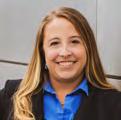
Outside of RubinBrown, Ashley lends her time and talents to organizations such as Junior Achievement and the Ronald McDon ald House.
To the benefit of the Colorado business community, Ashley serves on the Colorado Chamber of Commerce Tax Council, where she helps analyze, discuss, debate, and drive state and local tax legislation that maintains and grows the environment and fosters success for Colorado businesses. In 2019, she began serving on the SB19-006 Software Consortium Executive Council as a Colorado Chamber representative.
Whether serving her clients at the high est level, supporting and mentoring her colleagues, or helping to create favorable economic conditions in her community, Ashley is making a significant impact. As Finke writes, “It is women such as Ms. Granger who make the future look bright for the Colorado CPA community and all female professionals.”
President and Founder, JFS, LLC, Grand Junction
When you’re a small business owner navigating the tumul tuous times brought on by the COVID-19 pandemic, it helps to have Kelly Johnston, CPA, nearby.
“Kelly’s sage advice on how to manage the whitewater times that all businesses have been experiencing since 2020 has no doubt saved many small business owners from countless sleepless nights,” writes Grand Junction Area Chamber of Commerce Presi dent/CEO Diane Schwenke, whose organiza tion represents nearly 800 small businesses employing 37,000 people.
In addition to serving as a panelist on Chamber-sponsored webinars aimed at
helping small businesses in the community, Kelly serves as the Chamber’s Secretary/ Treasurer and sits on its Governmental Affairs Committee. She also serves on the search committee to secure the replacement for Schwenke, who is set to retire from her role after 32 years.
“She’s no bystander,” Schwenke writes, “but an active discussion participant who is respected by her fellow board members for her keen insights and observations.”
It isn’t just Kelly’s technical and business knowledge that have helped her emerge as a trusted and valued consultant in Grand Junction and beyond, according to Nancy Murphy, Regional Director of the West
Central Colorado Small Business Devel opment Center (SBDC). It’s her infectious enthusiasm for both the profession and supporting and educating others.
“What makes Kelly remarkable is her rare enthusiasm for the subject [of accounting], her ability to translate terms and concepts into plain English, and her passion for helping business owners build wealth,” she writes. “She’s vibrant, infectious, and makes accounting understandable, interesting, and relevant to a group that would rather be focusing on something else.”
In short, she adds, “Our clients love Kelly! She is truly a woman to watch.”
As a workshop facilitator for the West Cen tral SBDC’s strategic planning series, Leading Edge, and its monthly online series, Finance Fridays, Kelly has enlightened numerous Colorado small business owners on such topics as cash flow, budgeting, profitability, and understanding financial statements.
“Always the innovator,” as Murphy notes, she developed multi-session online training
that SBDC clients both within and outside of Grand Junction can access on demand.
Alongside running her own business – a healthcare-focused financial consulting firm – and engaging with the local community to bolster other small business owners’
success, Kelly has worked diligently on her own professional development, having earned her CPA license this past March.
“As a recent CPA, she has worked hard in continuing her professional development so she can keep bringing resources to the


Tax Manager, Chadwick, Steinkirchner, Davis & Co., P.C., Grand Junction
With a bachelor's degree in eco nomics, followed nine years later by a second bachelor’s in accounting and a quick rise through the ranks from Tax Intern to Tax Manager, Kristy Lindquist has a deep thirst for tax knowledge. It’s significant enough that her Chadwick, Steinkirchner, Davis & Co. (CSD) colleague, Braylee Cassavaugh, CPA, calls her an “absolute tax powerhouse.”
“Accounting is Kristy’s calling,” Cassavaugh says. “She has a thirst to know more, learn more, and research more. She contributes to our profession by always staying up to date on tax laws and communicating them to those around her.”
As impressive as her technical knowledge and desire to learn are, it’s Kristy’s leader ship skills and dedication to her profession, staff, and community that set her apart.
“Kristy encourages our tax team to stay positive as we work extra hours during
busy season - and works extended hours herself,” Cassavaugh writes. “One thing that I personally love about her help ing me with projects is that she always teaches me something new and some thing to learn on my own. She creates an environment where it feels good to learn. She is an upbeat and inspiring leader who is also empathetic and genuinely cares about [staff’s] well being.”
CSD Tax Principal Tara Stauffer, CPA, agrees, noting that “Kristy has taken the initiative to mentor junior staff. She is never too busy to answer questions or help staff work through new concepts or complex tax problems. Her positive atti tude and enthusiasm are infectious.”
As if the demands of her career weren’t enough, this working mom of two young children makes it a point to participate actively in her community. She serves as treasurer on the Museums of Western
rural communities of Colorado,” writes Marilyn Dent, who nominated Kelly as a Woman to Watch.
Kelly’s warmth for and dedication to her local community is obvious, and the feeling within her community clearly is mutual.
Colorado Board of Directors, which oversees the Dinosaur Journey Museum, the Cross Orchards Historic Site, and the Museum of the West.
Museums of Western Colorado Immedi ate Past Board President Orville Petersen, CPA, appreciates Kristy’s enthusiasm for the museums, which predates her involvement on the Board. He adds that Kristy brings a fresh perspective to the Board by visiting the museums with her family, participating in public events at each location, actively promoting the museums, and inviting other community members to join her.
“She shows great interest in what we do by keeping history alive in Western Colo rado,” he writes.
Whether in the office, in the commu nity, or on the Colorado Mesa University campus, from which her accounting degree comes and where she sometimes stops by to share with students her CPA journey, “It’s clear that Kristy is no stranger to hard work and dedication,” Cassavaugh concludes. “But what truly sets her apart is that she is simultane ously just as dedicated to her profession, her community, and helping others.”
Audit Partner, Watson Coon Ryan, LLC, CentennialDenver
Emerging Leader Kelly Watson, CPA, puts people first, and she’s willing to invest her time and look at things through a different lens to make a difference in their lives.
Michael Mussi, CPA, a former col league at Kelly’s firm, Watson Coon Ryan, LLC, knows first hand what a difference this kind of commitment can make. He writes, “I found Kelly to be one of the most compassion ate bosses I’ve ever worked for, and among the most dedicated people I have ever met. Her accounting acumen, coupled with her warm personality, made her an inspiration for my own personal career goals.
“My professional success today reflects Kelly’s investment in me,” he continues. “Without her thoughtful mentorship, I wouldn’t have had the same opportunities or skills that I needed to take charge of my personal and professional goals. I will always be grateful for the chance I was given to work with such a kind and intelligent boss as Kelly.”
In a move to maintain high satis faction among Watson Coon Ryan employees, Kelly and her fellow partners implemented several employee wellness initiatives. They include the elimination of time tracking to instead focus on value billing, unlimited paid time off, flexible work schedules, and – even before the COVID-19 pandemic forced these options on most busi nesses – fully remote and hybrid work options.
Kelly notes, “While our policies didn’t change as a result of the
pandemic, the entire team really embraced that change after COVID.”
Jeremy Ryan, CPA, Watson Coon Ryan, LLC Managing Partner, notes that Kelly has a willingness to try new ideas, combined with a dedi cation to staff and the profession.
“She has been a primary voice for embracing new ideas at our firm. We encourage flexible schedules and have invested in the technology to support that. We are moving away from daily time tracking to focus on value and expertise.”
A graduate of the prestigious AICPA Leadership Academy, Class of 2020, Kelly has emerged among her industry peers as an expert in areas such as governmental, single audits, and ERISA audits. In nominat ing Kelly as a Woman to Watch, fellow AICPA Leadership Academy graduates Sarah Flischel, CPA, and Alexandria Romero, CPA, note that “Kelly has become a tremendous resource to us through our shared network. She is always willing to answer questions that arise in the nonprofit sector.”
Outside of her firm, Kelly partici pates on the COCPA Governmental Conference Planning Commit tee, serves as Board Treasurer for Colorado Gift For Kids and Raising Kindness, and is Treasurer of a local Girl Scout Troop.


Kelly gets plenty of practice balanc ing family life with her profes sional life and manages it all with grace and kindness. Kelly and her husband Elliott are parents to five young children, who have a great role model in their mom.
2021
Lisa Hackard, CPA Sebrina Ivey, CPA/PFS, CIA Tammy J. Rivera, CPA
2019
Stephanie Drew, CPA, CFE Amanda Jo Erven, CPA, CIA, CFE Kelly Kozeliski, CPA
2018
Kimberley Higgins, CPA Sharon Lassar, Ph.D., CPA (Florida) Leslie Schaus, CPA 2017
Laurie Anderson, CPA Jane Everhart, CPA
2016
Judy Cain, CPA Christine Noel, CPA Debbi Warden, CPA 2015
Lori Gibson, CPA Katrina Salem, CPA Laura Srsich, CPA
2014
Stacey Hekkert, CPA Tracy Huggins, CPA Judy Vorndran, CPA
2013
Peggy Jennings, CPA Lynne Lehr-Buck, CPA Sandy Shoemaker, CPA
2021
Sarah Flischel, CPA
Allyson Lindsey, CPA Alexandria Romero, CPA
2019
Janeen Hathcock, CPA Elizabeth Maldin, CPA Rosie Sanchez, CPA 2018
Kristin Holthus, CPA Danika Greiner, CPA
2017
Ksenia Popke, CPA Rebecca Kelley, CPA Andrea Geerdes, CPA
2016
Erin Breit, CPA Meghan Mahala Dack, CPA Kerri Hunter, CPA
2015
Tyra Litzau, CPA Monica Martinez, CPA Shauna Shafer, CPA
2014
Mary-Margaret Henke, CPA Jennifer Scholz, CPA Jessica Seidlitz, CPA
2013
Jami Coulter, CPA Georgia Phillips, CPA Kelly Rodriguez, CPA Rhonda Willert, CPA
Kelli Davis, COCPA Executive Assistant, supports CEO Alicia Gelinas, CPA and Rebecca Campbell, COO/CLO. Contact her at kelli@cocpa.org.
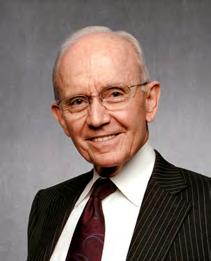
On May 9, 2022, friends, family, and colleagues gathered to remember retired University of Denver Profes sor Emeritus James E. Sorensen, PhD, who was known not just for his teaching career which spanned more than half a century but also for his pioneering research and contributions to management accounting education.
Over the course of 52 years, Sorensen published more than 125 articles, books/ chapters, technical reports, and cases. When a team from the IMA nominated Sorensen for the American Accounting Association’s (AAA) Hall of Fame, it took nearly 40 pages to list the many publications and honors amassed during his career.
In her letter of recommendation to the AAA, Dr. Sandra Richtermeyer, Dean and Professor of Accounting at the University of Massachusetts Lowell, praised Sorensen for his influence on students. “He made a significant impact on the lives of account ing and MBA students. He was a favorite professor because he focused on teaching his students what they needed to succeed in their professional careers. He taught them how to hit the ground running immediately, whether they were pursuing careers as professional accountants or leaders (MBAs) who would be using management account ing information in supporting decisions, planning, or control activities.”
For more than four decades, retired DU professor Hugh Grove researched with and worked alongside Sorensen. In fact, Grove came to DU in 1975 after complet ing his Ph.D. at the University of Southern California (USC) specifically to work with Sorensen. “As a Ph.D. student, you had to
read the current research in your field of interest, so I was familiar with the work Jim was doing,” Grove says. “We called him a management accounting guru. He was innovative in expanding boring old cost accounting. He took variances and trans lated them into more meaningful manage ment control systems.”
Grove says Sorensen became a mentor. “He inspired me to do more creative, out-ofthe-box research,” he reflects.
The research Grove participated in focused on cost outcomes and cost-effectiveness topics which he says went well beyond typ ical cost accounting research. “When I pre sented a research paper at USC, someone commented that it wasn’t really account ing research at all. That summarized the type of creative contributions Jim made to accounting research over his career.”
Sorensen and Grove moved into offices next to each other when the Department of Accountancy relocated in 1999 to its new
Early in her teaching career, Richtermeyer began traveling nationally, presenting, and teaching CPE alongside Sorensen. “Jim wanted to look at the practice of manage ment accounting. His research focused on topics related to the gaps between account ing education and practice. He cared about going beyond theory by looking at things like job choice, bureaucracy, and turnover.”
home in the Daniels College of Business building. Grove says Sorensen’s office wasn’t very organized but exuded creativity and energy. “Jim’s office was always piled high with papers,” he says. “There was often no room for anyone else to sit. I said when he retired, he should hire a backhoe to remove all his stuff!”
The pair also shared mutual gratitude for Glyn Hanbery who was dean of the DU School of Accountancy at the time. “People always got sucked into admin roles, and we joked and agreed that it was one of our major professional accomplishments that we never had to be department chair or asso ciate dean. We felt it would have taken us away from what we really wanted to do.”
In the mid-90s, Sorensen teamed with Gary Siegal to co-author the groundbreak ing study, What Corporate America Wants in Entry Level Accountants. “Companies were expressing concerns about how prepared entry-level accountants were,” Richtermeyer recalls.
Sorensen and Siegal followed up the first study with additional practice-based studies and gap analyses of the practice of manage ment accounting and educating people. “It just shows that he identified an entire area of preparation issues when we tend to focus on CPA firm careers and not as much on the management side,” Richtermeyer adds. “We came up with a set of skills that practicing accountants need.”
"Sorensen...inspired me to do more creative, out-of-the-box research.”
Sorensen, Siegal, and Richtermeyer trav eled the country presenting the Balanced Scorecard workshops. “Jim took so much care in the CPE workshops to do things that were innovative, hands-on, and high energy,” she says. “I learned so much about teaching these workshops with Jim and Gary. Jim put finesse around these topics that might seem boring to help people see how strategically important these issues are to driving a busi ness forward. It was really remarkable.”

Richtermeyer says those early studies were so well-cited that they became the core documents the team referenced for years. “Jim helped a lot of us in academia under stand what to focus on in the classroom and opened our eyes to new research. It’s a challenge to have both the corporate and academic sides appreciate the same thing, but Jim accomplished that.”
Sorensen had a reputation for paying atten tion to both the little things and the big











things. “The true spirit of us being accoun tants is paying attention to the little things, but Jim did it in a way that he could really extract what was relevant and then put it in a way that was understandable and appealing," Richtermeyer says. “He could synthesize and articulate the heart of the matter.” She also describes him as “an easy leader.”
While Sorensen was well-known among business professors, Richtermeyer says he also stepped easily into cross-functional ity, attending conferences and presenting to many different types of organizations including the Decision Sciences Institute. “He wanted to spread the word about the research he was doing. He wanted us to make it fun and innovative at a time when there wasn’t a lot of that going on,” she says. “In academia, we tend to focus on ‘this is what academic research needs,’ but Jim and Gary always focused on both sides.”
When Richtermeyer was installed as IMA’s Global Chair in 2010, she was permitted to bring a guest. She immediately invited




Sorensen to join her. “He worked until he was 80,” Richtermeyer says. “We should all be that lucky.”

In a written tribute to the DU community after Sorensen’s passing, current DU School of Accountancy Director Dr. Sharon Lassar wrote: “Jim Sorensen was known across the globe for his research, but he was deeply rooted here. He strived to live Daniels’ values and raise our reputation. He helped shape the college by providing honest, constructive, and thorough guidance to assistant and asso ciate professors as they built their careers. He acted ethically and collaboratively for the benefit of the community of scholars so that, as a unit, we would strive for excellence in all we do.”
Former COCPA CEO Mary E. Medley remem bers “Doc” as the brilliant researcher and professor who always had a sparkle in his eye and palpable passion for his work, his students, and his colleagues. His legacy lives on in the difference he made for all those fortunate to know and work with him.
Throughout the COVID-19 pandemic, the American Insti tute of CPAs (AICPA) continually urged the IRS to address taxpayer service challenges worsened by the pandemic. The backlog of unprocessed mail, returns, and adjustments at the IRS has reached a critical stage that is adversely impacting taxpayers and tax practitioners. On July 11, 2022, the AICPA submitted a letter to the Department of the Treasury and the IRS calling on them to do more to ensure that taxpayers and practitioners are not subjected to another tax filing season in 2023 with unprecedented inventory levels, which would lead to delays in processing and incorrect notices and penalties. The letter provided proactive steps the IRS could take.
In mid-August, 93 Members of Congress – led by Senators Bob Menendez (D-NJ) and Bill Cassidy (R-LA), and Representatives Abigail Spanberger (D-VA) and Brian Fitzpatrick (R-PA) – signed a bipartisan, bicameral letter to IRS Commissioner Charles Rettig, endorsed by the AICPA, stating, “…we believe that the IRS must take additional steps to improve customer service issues, decrease processing delays, and work-down the backlog of paper returns and correspondence by continuing the max imum use of overtime and surge teams, as well as the contin ued suspension of automated notices and collections - which have been critical in reducing pandemic-related tax return and
correspondence backlogs. Additionally, the IRS must improve its recruitment and retention efforts to adequately address the backlog and increase levels of taxpayer service.” Colorado Sena tor John Hickenlooper was among the signers.
The correspondence cited a National Taxpayer Advocate report stating that the paper return backlog increased by 1.3 million from the same point as last year and that the IRS was only able to meet 12 percent of its hiring goals for customer service rep resentatives.
The two letters delivered similar messages to the IRS: Take steps now to reduce the backlog and improve service to taxpayers and practitioners ahead of the 2023 tax season. “It’s important for the IRS to take immediate steps to prevent another stress ful and confusing tax season for taxpayers, practitioners, and the IRS,” said AICPA Vice President of Tax Policy and Advocacy Edward Karl. “Until the backlog is truly at a healthy level and the IRS’s service deficiencies are corrected, taxpayers and prac titioners will continue to be unfairly and unnecessarily bur dened. The common-sense steps the AICPA and Congress have urged the IRS to take now would give the Service some muchneeded breathing room ahead of the next filing season.”

The Educational Foundation of COCPA Board of Trustees awarded $3,000 scholarships to 36 juniors, seniors, and graduate students for the 2022-2023 academic year - $108,000 spread across 11 Colorado colleges and universities. Congratulations to the following future members of the profession.
President Alexandra (Alexie) Tune, CPA Deloitte LLP, Denver
Vice President Tiffany Knight, CPA Kundinger, Corder, and Montoya PC
Treasurer Judy A. Thomas, CPA Regis University, Denver
Past President Laura Theiss, CPA Moss Adams LLP, Denver
Executive Director Alicia Gelinas, CPA Colorado Society of CPAs, Englewood
Jeffrey Damm, CPA SM Energy Company, Denver
Stephanie Daniels, CPA RubinBrown LLP, Denver
Kathleen (KED) Davisson, CPA University of Denver, Denver
Lora Finley, CPA
Synergy Accounting & Advisory Services LLC, Littleton
Mary E. Medley, IOM Colorado Society of CPAs, Englewood
Matthew Ogaz, CPA CoBank ACB, Greenwood Village
Caitlyn O’Neil, CPA CBIZ/MHM, LLC, Denver
Magdalena Gembal, Colorado Mountain College
Jacklynn Snyder Larson, University of Colorado-Colorado Springs
David Dirks Memorial Scholarship
Katie Scott, Metropolitan State University of Denver
Shana Park, University of Denver
Misty Osmundsen, Colorado Mesa University
Sonja Kuranz, University of Denver
Gordon Scheer Scholarship
Alexis Doidge, Regis University
IvyRose Barnish, Colorado State UniversityFort Collins
Emma Parker, University of Denver
Matthew Belter, University of ColoradoBoulder
David Brown, Metropolitan State University of Denver
Bridget Kalicki, University of ColoradoColorado Springs
Sarah Heathershaw, Fort Lewis College
Este Wilkinson, University of Colorado-Boulder
Corin Turner, University of Denver
Cole Munoz, Colorado State University-Pueblo
Otto and Betty Butterly Scholarship
Morgan Armas, University of Colorado-Boulder
Past Presidents Scholarship
Matthew Kalof, University of Denver
Savanna Harris, University of Colorado-Boulder
Megan Johnson, Colorado State University-Fort Collins
Megan O'Connor, University of Denver Allison Shehorn, Colorado State University-Pueblo
Su Hyun Kim, University of Denver
The Teresa Christensen Memorial Scholarship
Preston Scheidt, Colorado State University-Fort Collins
Robert Avery, University of Colorado-Boulder
Seth Conner, University of Denver
Katherine Daniels, University of Denver
Theresa Hornung, University of ColoradoColorado Springs
Will Irvin, University of Denver
Hannah Johannesman, University of Denver Ashlyn Johnson, University of Denver Xiaoyong Olsen, University of Colorado-Denver
Diane Petelo, Colorado Mesa University
Nicolle Plasencia, University of Denver
Craig Shellenberger, University of Denver
Anna Whittier, University of Colorado-Boulder
The COCPA Educational Foundation Board of Trustees extends a special thank you to the following faculty and academic staff who have supported these scholarship recipients in their studies and served as a scholarship referral:

G. Suzanne Owens-Ott and Christine Noel, Colorado Mesa University
Lisa Kutcher, Eric Lohwasser, Jr., and Mandy Sharpe, Colorado State University - Fort Collins

Laurie Corradino and Tene Greenhood, Colorado State University – Pueblo
Chris Lyon, Fort Lewis College
Andrew Holt and William Mesa, Metropolitan State University of Denver
Don Bush, Regis University
Jeremiah Contreras, Susan McMahon, Susan Morley, Josh Neil, Francis Tice, and Sarah Zechman, University of Colorado – Boulder
Magan Calhoun, Brian McAllister, and Blaise Sonnier, University of Colorado – Colorado Springs
Katherine Gunny, University of Colorado – Denver
Adam Booker, Kathleen (KED) E. Davisson, Beth Flambures, Tom Hall, Sharon Lassar, Suzette Loving, and George Ruch, University of Denver

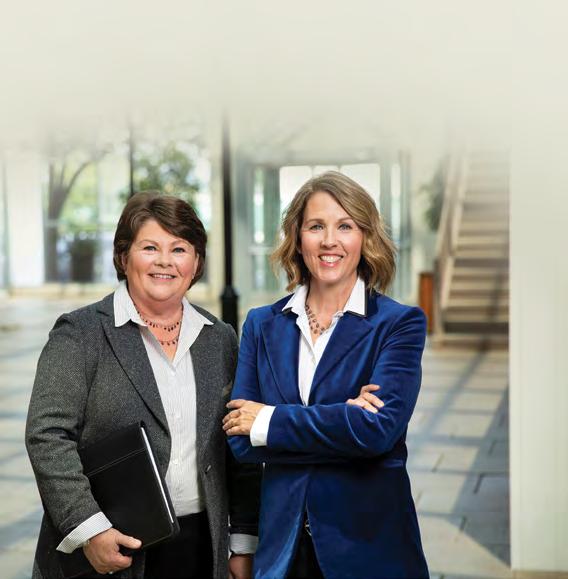
When Colorado’s Equal Pay for Equal Work Act (“EPEWA”) went into effect at the beginning of 2021, Colorado became the first state in the U.S. to require employers to disclose compensation (or a range of compensation) in its public job postings. The far-reaching job-posting requirements, intended to combat pay discrimination, have had some unintended con sequences. Most notably, the law has made national headlines as some employers have attempted to avoid the compensation-post ing requirements by excluding Colorado workers from applying to remote job listings with phrases like “the position may not be performed remotely from Colorado” or “role can be performed anywhere in the United States except Colorado.”
On July 21, 2021, the Colorado Department of Labor and Employ ment (CDLE) issued a revised Interpretive Notice & Formal Opin ion (“INFO #9”) to clarify its interpretation of the EPEWA (and to stop the trend of job postings excluding Colorado workers). Here are the key takeaways from INFO #9 for employers to consider when posting a job.
Who is required to comply with the EPEWA?
• Any entity that employs at least one person in Colorado.
What compensation information must be included in a job posting to be compliant with the EPEWA?
• The rate of compensation (or a range of compensation). If the posting includes a range, it must include both the lowest and highest pay the employer genuinely believes it might pay for the particular job. Ranges cannot be left open-ended, so an employer cannot post “$60,000 and up” or “up to $60,000.”
• A general description of bonuses, commissions, or other com pensation.
• A general description of benefits being offered with the posi tion, such as health care, retirement benefits, paid days off, and tax-reportable benefits. However, “minor perks” like on-site gyms, nap rooms, or free ice cream do not need to be included.
• The compensation information can be included in a linked document or page rather than on the job posting itself as long as the posting clearly explains that the compensation can be found through the link.
Are there any exceptions to the compensation-posting requirement for out-of-state jobs?
• If a covered entity posts a job that will be performed entirely outside Colorado because the job is tied to non-Colorado worksites, the posting does not need to include compensation
information. For example, if a restaurant posts a job for a server position in North Dakota, the posting does not need to include compensation information because the job would be per formed entirely outside Colorado and is tied to a non-Colorado worksite.
Can an employer hiring for a remote position avoid the compensation-posting requirement by specifying that the job “cannot be performed in Colorado” or otherwise excluding Colorado applicants?
• No. If an employer posts a remote job (i.e., a job that could be performed anywhere), it must include compensation and bene fits information. According to INFO #9, “a remote job posting, even if it states that the employer will not accept Colorado applicants, remains covered by the Act’s transparency require ments.” The CDLE has clarified that a remote job excluding Colorado applicants would not fall into the narrow exception for out-of-state worksites.
Does the EPEWA have any requirements about posting for promotional opportunities?
• Yes. Employers are required to make reasonable efforts to announce promotional opportunities to all Colorado employ ees prior to making a promotion decision. These announce ments must include the job title, instructions for applying, and compensation (unless the position is tied to a non-Colorado worksite).
• The term “promotional opportunity” is interpreted very broadly to include any job that is superior to another job in terms of compensation, benefits, status, duties, opportunities, or access to further career advancement.
• There are a few exceptions to the notice requirement: Employers do not have to provide notice of a promotional opportunity if the opportunity is to replace an incumbent employee who is unaware of his or her impending separa tion.
Employers do not have to provide notice of a promotion where consideration for the promotion automatically follows a trial period of less than one year as memorialized in writ ing (through offer letter, contract, or handbook). No notice is required for temporary positions lasting less than six months.
Heidi K. Wilbur, J.D., is a partner with Fox Rothschild LLP, Denver. Contact her at HWilbur@foxrothschild.com.

Is there such a thing as too much work for accounting firms? That question may be like asking if a glass is half empty or half full. Learn how firms are finding new opportunities amidst an avalanche of new work.
Complexity, uncertainty, and the pan demic have coalesced to create a sig nificant impact on accounting firms and generating a lot of new work for them, but Susan Coffey, CPA, CGMA, CEO – Public Accounting at the Association of Interna tional Certified Professional Accountants, says rather than seeing it as problematic, it presents a great opportunity for firms to take a deep dive into their business models and prepare to transform.
“Some people may look at the current situation and call it too much work,” Coffey says. “What’s happening though is firms are deliberately creating a level of agility that’s never existed before by examining their governance structures, deciding what clients they’ll accept and retain, studying fee struc tures, and planning for a transformation.”
Every industry is feeling the pinch of the Great Resignation, but the pandemic created an avalanche of complex work in the wake of the Paycheck Protection Program and the Employee Retention Credit. The challenge to find qualified talent ties closely to firms’ ability to handle more complex client work. “Firms are asking how they’ll be the employer of choice based on their evolving business model,” Coffey continues. “They’re looking at whether the new business means a new culture, if the right levels of flexi bility are in place for this new generation, and if they’re providing the appropriate
advancement and leadership opportunities. There’s a host of things firms are doing to re-evaluate.”
Retired national firm partner Jim Brendel, CPA, says staffing shortages have been on firms’ radar for years. “If you talk to firms, you’ll hear it’s not about too much work. It’s more about wishing we had more people.”

He also says firm culture isn’t as “sticky” as it used to be. “It’s not only whether someone decides to change jobs but also
to take on a new client you felt would be great but couldn’t because you just didn’t have the resources.” Now, Brendel says he sees firms going through their client base and determining which ones are the best fit. “An emphasis on growth is healthy, but accountants are sometimes afraid to walk away from a client. Now, with work coming faster than you can staff up, it makes you more confident to tell a client that isn’t the best fit to find a new firm. In fact, we can help them find a firm better suited for them
when they do it. It was always a given that you didn’t leave a firm during busy season, but in these past two years, that hasn’t been true. Iit can be problematic when your workload is especially heavy.”
Brendel describes the dramatic increase in work for accounting firms as somewhat like the 2003 post-Sarbanes Oxley environment.
“Because of the increased regulations, firms had to decide which clients they could keep and which they weren’t able to serve,” he says. “It was incredibly frustrating not
– that’s ultimately better for the client and for us.”
There’s always that reluctance to say no, but it’s important to strike a balance with the needs of a community member, explains Mike Lauer, CPA, Partner at Lauer, Szabo & Associates, P.C. in Sterling. The firm’s work is split nearly evenly between tax and gov ernmental audit work.
“For the most part, we are having to be more selective, but not accepting new work
What we’re experiencing now may feel like something that’s never happened before, but it has manifested itself in different ways and at different times.
can be damaging from a firm perspective. I hate to turn people away, but I’m honest with people that we may not have the ability to take them on because of our current workload,” Lauer says.
Lauer always takes the time to meet with an individual or business to discuss their particular issues and has no problem referring work to other CPAs, “Frankly, they’re not rushing to take on new work either. That’s hard. Where do these people go?” he asks.
Lauer says the firm steps through a process of evaluating new clients after meeting with them. The firm is more likely to take on a new client that is referred by or has a working relationship with a current client. “We evaluate our bandwidth to see if we can take on the work without sacrificing service to our current clients,” he says. “Our cur rent clients are expanding and adding entities, so we try to recognize what level of service they’re going to need. We try to plan, but there are always unexpected events." Lauer adds that these days, work just seems to take longer to complete because of increasing regulation. “It may be just 15 minutes here or there, but those hours add up.”
Lauer echoes Brendel’s sentiment that staffing has been a longtime challenge that is especially prevalent now as everyone looks to hire experienced staff. “That’s not unique to small firms, but the supervising and training takes a lot of time,” he says. “With the complexities of our government and agricultural clients, there is uniqueness to what we do that requires a certain experience level.”
As they look ahead, firms are being strategic about their use of tech nology and how they leverage it to handle workloads, Coffey says.
“Technology enables firms to compete on a level playing field and frees people up to do higher level work,” she explains.
Firms of all sizes also are more actively outsourcing and offshoring even though just a few years ago, smaller firms expressed discomfort with these concepts. “Many service providers offer a whole host of solutions for better managing the opportunities coming through the door,” Coffey says.
What is being offshored and outsourced and where? Some firms are offshoring basic inputs for tax compliance that can’t be automated. “Any firm can outsource or offshore anything. It’s just a matter of finding the right provider or subsidiary,” Coffey says.
With the CPA Examination now being offered in India, people living there are seeing the value proposition in obtaining the CPA designa tion. “Some of the talent doing this work is excellent, and now they have a career path,” Coffey says.
Brendel says Global Capability Centers in India are allowing firms to transform. “These facilities have evolved from being a low-cost back office to being a strategy to add capabilities and resources, with cost being just an additional benefit.”
Deloitte LLP has three offices in India operating with full-time employees rather than contractors. The time zone differences can actually be an asset. “We see projects where someone in the U.S. takes the work to a certain point, turns it over to someone in India and the Philippines, and then it gets turned back over to the U.S. in the morning. Projects move further ahead, and work is completed more quickly,” Coffey says.
Wayfair, LLC recently filed suit in Colorado’s Jefferson County Court against the City of Lakewood. The City assessed Wayfair roughly $600,000 in uncollected sales tax arguing the company has a filing obligation in Lakewood because Wayfair has economic presence in the city.
In 2018, the U.S. Supreme Court held that states could require remote sellers to collect sales tax based on economic presence, specifically sales volume alone, either $100,000 in sales or 200 separate sales tax transactions of any amount. The key question before the Colorado court will be whether a remote seller with no physical presence in Lakewood must collect the city’s sales tax based on economic presence.
The attorneys representing Wayfair, Martin Eisenstein and Nathaniel Bessey, published an excellent article in Tax Notes State discussing the issues. They argue that because of the complexity of Colorado’s home-rule cities and associated compliance, such cities are prohibited from asserting a filing obligation based on economic presence. See Martin I. Eisenstein and Nathaniel A. Bessey, “A Step Too Far: Economic Nexus in Colorado,” Tax Notes State, Volume 105, Number 5,August 1, 2022, cover and pp. 487-494, reprinted with permission, cocpa.org/A-Step-Too-Far.
This case has enormous implications for Colorado. Watch for future updates.
Factors like declining birth rates and changes to U.S. immigration policy mean entry-level talent will continue to be a challenge, not just for accounting but for most professions that require a college education. “When you have fewer students enrolling in higher edu cation overall, that means fewer accounting grads and exam takers to eventually do the work,” Coffey says. “We need to think of a profession-wide multi-stakeholder solution we can get our arms around.”
It will be important to reach out to students earlier than ever before via social media campaigns and to begin talking about the profession differently. “We have a good story to tell and the right words that resonate with young people,” Coffey asserts. “Entrepreneur ship - every partner is an entrepreneur; job stability - as a profession, we are needed and do well in good times and bad; and profes sional growth - our model is based on it. We
have these things; we just don't talk about them. We have to get the word out."
It's also time to talk about the new, different, and exciting work accountants are doing. ESG is just one example. “Everything about this space is in our wheelhouse,” Coffey says. “Firms are asking how they can become attractive to young people. Look at your service deck. Think about how to incorporate services that excite the younger generation and provide them opportunities to develop and advance the firm.”

Coffey encourages firms to ask themselves: How can you be the best at what you want to be? “That will lead to creating a culture which leads to talent attractiveness,” she says. “It’s this symbiotic rotation process.”
Brendel suggests doing more to develop your firm’s younger people. “Get them to senior faster,” he advises. “That’s one big piece of the answer. Investing in them and moving them more quickly through training and giving
them more on-the-job experiences are cru cial. Grow from within. We don’t change as quickly as some other professions, although we’re making progress. But we’re just going to have to do it faster and not be wedded to whatever timetable used to exist for someone to get to senior manager or partner.”
Coffey says what we’re experiencing now may feel like something that’s never hap pened before, but she thinks it has mani fested itself in different ways and at different times. “What an amazing profession we are to have adapted so quickly during a pan demic, pivot, and support our clients and our nation’s economy, survive, and then thrive.”
Coffey said. “We created so much trust and propelled our brand forward. Our agility as a profession really showed up. We did it for our clients. Now, we have to do it for our firms.” And, do it for sustainability of the profession, too.
CAMICO knows CPAs, because we are CPAs.
CAMICO knows CPAs, because we are CPAs.
Created by CPAs, for CPAs, CAMICO’s guiding principle since 1986 has been to protect our policyholders through thick and thin. We are the program of choice for more than 8,700 accounting firms nationwide. Why?
Created by CPAs, for CPAs, CAMICO’s guiding principle since 1986 has been to protect our policyholders through thick and thin. We are the program of choice for more than 8,700 accounting firms nationwide. Why?

CAMICO’s Professional Liability Insurance policy addresses the scope of services CPA’s provide.
CAMICO’s Professional Liability Insurance policy addresses the scope of services CPA’s provide.
Includes unlimited, no-cost access to specialists and risk management resources to help address the concerns and issues you face as a CPA.
Includes unlimited, no-cost access to specialists and risk management resources to help address the concerns and issues you face as a CPA.
Provides potential claim counseling and expert claim assistance from internal specialists who will help you navigate the situation with tact, knowledge and expertise.
Provides potential claim counseling and expert claim assistance from internal specialists who will help you navigate the situation with tact, knowledge and expertise.
Does your insurance program go the extra mile? Visit www.camico.com to learn more.
Does your insurance program go the extra mile? Visit www.camico.com to learn more.
Alpa (Keily) Evans, Account Executive
T: 800.652.1772 Ext. 6720
E: aevans@camico.com
W: www.camico.com
Alpa (Keily) Evans, Account Executive T: 800.652.1772 Ext. 6720
E: aevans@camico.com
W: www.camico.com
Accountants Professional Liability Insurance may be underwritten by CAMICO Mutual Insurance Company or through CAMICO Insurance Services by one or more insurance company subsidiaries of W. R. Berkley Corporation. Not all products and services are available in every jurisdiction, and the precise coverage afforded by any insurer is subject to the actual terms and conditions of the policies as issued. ©CAMICO Services, Inc., dba CAMICO Insurance Services. All Rights Reserved.
Accountants Professional Liability Insurance may be underwritten by CAMICO Mutual Insurance Company or through CAMICO Insurance Services by one or more insurance company subsidiaries of W. R. Berkley Corporation. Not all products and services are available in every jurisdiction, and the precise coverage afforded by any insurer is subject to the actual terms and conditions of the policies as issued. ©CAMICO Services, Inc., dba CAMICO Insurance Services. All Rights Reserved.
www.cocpa.org
 BY BEN SOETER
BY BEN SOETER
Many organizations realize the importance of ESG (environ mental, social, and governance) performance. Putting effort into ESG can improve organizations by making them more efficient and helping them manage risks. Organizations use ESG programs as a differentiator when telling their story to investors, customers, employees, and other stakeholders. However, some organizations have concerns about whether putting effort into ESG programs is worthwhile. Below are a few myths about ESG.
One of the greatest challenges for business leaders — including those in the accounting profession - is attracting and retaining talent.
By embracing the opportunities and challenges of ESG, firms and companies can attract and retain talented people who will be able to address client expectations around ESG. As the future of the profes sion, young professionals bring a unique set of expectations to the hiring pool. Employees are increasingly choosing employers with values that align with their own. Some entering the workforce have grown up learning about the importance of diversity, equity, and inclusion and the risk of climate change and may have very different expectations for their workplace and the goods they consume.
The demand for talent provides new leverage to job seekers: Employers are providing flexible and fulfilling work along with training and expanding opportunities for their employees.
Firms are embracing the changing needs of their clients and upskilling their professionals to keep up with the latest technology. Organizations should be cognizant of the needs and expectations of their employees. Offering opportunities in ESG is a tool for achiev ing these objectives, and companies that successfully develop and integrate ESG practices into the everyday can benefit. Firms that offer these opportunities will have a clear and competitive advantage in the hiring process.
ESG is not only a challenge to navigate but also an opportunity to unlock value. Companies should look beyond the costs of ESG to the potential for profitable growth.
A study from the KPMG Board Leadership Center shows that nearly 90 percent of directors report their companies are reassessing how the interests of customers, employees, and investors are addressed.
Two-thirds identify ESG as important to long-term performance and value creation, and 99 percent believe it’s important to align strategy and business practices with the interests of these key stakeholders.
A baseline global standard for ESG reporting is gaining momen tum, driven by standard setters and government regulators. The SEC regulatory agenda includes multiple ESG items, while the SEC Enforcement Task Force Focused on Climate and ESG will review ESG-related disclosures, presenting new regulatory risks. Mean while, the recently formed International Sustainability Standards Board is working toward a comprehensive global baseline of sustainability-related disclosure standards. Firms are also seeing trends toward integrated reporting, where companies report on both financial and sustainability information, building a report around the preparer’s unique circumstances without the benefit of a stan dardized template.
This increased demand for transparency comes from all directions and affects every department and level of an organization. Reacting to this demand, companies are searching for better ways to report on employee diversity, supply chain social responsibility, greenhouse gas emissions, and a host of other ESG topics. They should prepare to enhance sustainability reporting today to stay competitive and keep up with changing regulations.
CPAs are on each client’s unique ESG journey with them. We recog nize all companies face different demands with unique stakeholders, challenges, and experience with ESG matters in the context of a rapidly evolving landscape. A CPA's role is to help clients navigate this landscape, mitigate risk, and find opportunity. We have an opportunity to work proactively with clients, help them interpret regulations, and present appropriate data. My firm is on its own ESG journey, and our approach is to embed ESG capabilities throughout the firm, in every practice, with every partner and professional. It underlies everything we do.
Consultants can collaborate with clients to develop and implement an effective ESG strategy, ultimately developing a plan to measure and report relevant metrics.
One of the greatest challenges for business leaders — including those in the accounting profession - is attracting and retaining talent.
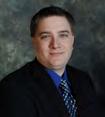 BY RICH CROCKETT
BY RICH CROCKETT
When drafting or reviewing a business continuity plan, it’s always important to consider your IT services partner and how it can help strengthen your plan. What do a business continuity plan and a Controlled Environ ment have to do with each other? When it comes to the information technology portion of your plan, they have everything to do with each other. Ensuring that your team can function in the event of a small or catastrophic failure of people, processes, or systems is critical. Your server is down. Your office is unusable. You’ve been the victim of a ransomware attack. Rogue employee. All these things can happen.

Part of an owner’s and an MSP’s (Managed Service Provider) job is to do everything in their power to keep these events to a minimum and have a plan in place for when they do. Conducting an analysis of these scenarios to see how your tools would function is critical to continued and uninterrupted operation during these sometimes-un preventable circumstances. Working with your MSP to identify holes in your strategy, the tools you use, or at least identify ways to ensure operations can continue if a small or large disaster strikes is a major piece of the business continuity plan.
Does the CRM (Customer Relationship Management) you use have a cloud version available that no longer requires a server? Is your internal file system available to you anywhere and everywhere without having to rely on a single source for it? What about your data? Is it backed up? Are you following regulatory requirements? If a team member clicked on something he or she shouldn’t have and a ransomware or damaging malware gets into your systems, do you have a plan to address this?
Proper cyber security, cloud-based tools, reliable third party cloud backups, laptops instead of desktops - all are examples of ways that might be more effective for you to operate your business. These examples also could work for the times your office is closed or internet service is down for a reason beyond your control. A weather event? No problem. Accidental data loss? No big deal.
What is a controlled environment, and how does it fit into all this? A controlled environment is a series of IT systems and policies over which the business and its MSP partner have complete control. Need to onboard or offboard an employee? With a controlled environment, you’ll know exactly what that means to you and your team. It won’t affect anyone’s ability to do their job. A list of all business assets such as laptops, desktops, network equipment, and software licensesand policies in place on how the management of all these assets is handled as well as how to handle common and uncommon IT events - is also crucial. These plans can include software control, content filtering, and more.
Knowing where you stand with your physical assets, how to control them, how to manage and control all the software and access to it, and that the business can continue to operate even in the event of a failure is what having a controlled environment is all about. This organized controlled environment is a huge component of any busi ness’s continuity plan.
Once the plan is established, it’s important to review it at least annu ally to ensure you are still on track or if any tweaks need to be made. An acquisition or major initiative could change the plan. It’s import ant to partner with your MSP to ensure you are on track no matter how your business moves forward. If you aren’t confident that you have these systems and policies in place, talk to your MSP partner right away. A business continuity plan without considering IT is an incomplete plan. Other than your people, it should be the most important consideration for business continuity. You cannot have a complete IT plan without considering having a controlled environ ment or an environment that is moving towards complete control. Consider it another key to your short-term and long-term success in this ever-changing world.
Colorado Real Estate License and CPA
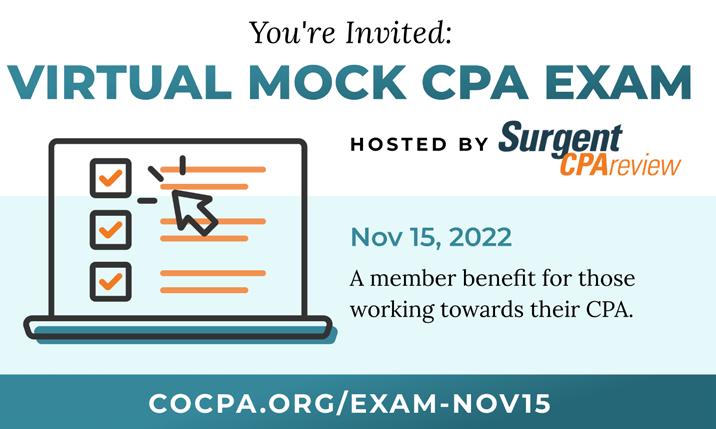
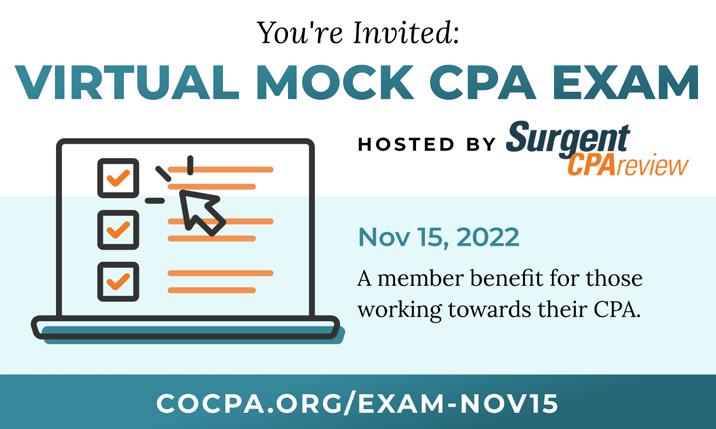
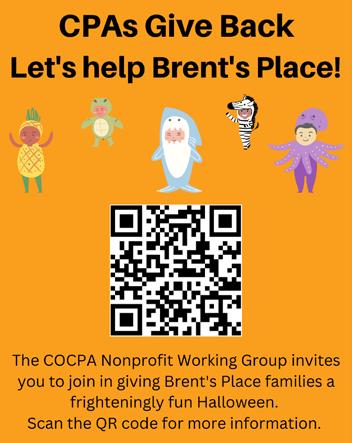

When Silicon Valley brought scooter-sharing to market in 2017, the service was supposed to be one solution to the problem of “last mile” commuting – covering the distance between your office and wherever your public transit drops you off – without making commuters dash the last blocks in their work clothes. Unfortunately, there wasn’t a lot of structure to the earliest programs, and e-scooters were frequently left here, there, and everywhere much to the dismay of residents and city officials.
According to a report from the U.S. Consumer Product Safety Com mission (CPSC), hazard patterns associated with micro mobility products, injuries, and deaths continue to rise. There were more than 190,000 emergency room visits due to all micro mobility products from 2017 through 2020. ER visits increased a steady 70+ percent: 34,000 (2017), 44,000 (2018), 54,800 (2019), 57,800 (2020).
Much of the increase from 2017 to later years was attributable to ER visits specifi cally involving e-scooters, which rose three times as much, from 7,700 (2017), to 14,500 (2018), to 27,700 (2019), and 25,400 (2020).
A CPSC report showed 71 fatalities associated with micro mobility products from 2017 through 2020.
Now, with experience – both good and bad – under their belts, local governments across Colorado are launching official micro mobility programs not only to organize these modes of transportation but also to grow their usage in hopes of cutting down car traffic and making the new options safer and more accessible to all.
Micro mobility refers to a range of small, lightweight vehicles operating at speeds typically below 15 mph and driven by users personally (versus a pedicab). Micro mobility devices include bicycles, e-bikes, electric scooters, electric skateboards, shared bicycles, and electric pedal-assisted bicycles. The devices provide an alternative, flexible,
and affordable way for people to travel short distances, help reduce vehicle traffic, and free up parking.
• Unlocking the device typically involves:
• Locating it
• Opening the corresponding app and scanning the QR code
• Riding where you need to go
• Locking the scooter by taking a picture of the QR code
Typically, users are charged a set fee for renting a scooter ($1 seems to be the going rate in 2022), plus a plus a per-minute rate which varies by location.
Because most micro mobility devices are now dockless, rental companies employ local workers who “rebalance” the devices, place them where needed, and recharge batteries if needed.
After Colorado Springs City Council expressed interest in a pilot scooter project in 2020, Traffic Engineering Division Man ager Todd Frisbie took on the role of lead project manager for the city’s scooter proj ect. After nine months of research and an RFP process, the one-year pilot program was launched in October 2021 using vendors Lime and Veo.
At the halfway point in the trial, Frisbie said the program was doing well, especially considering it was underway for only two months before winter began. He has been
pleasantly surprised by the usage numbers which are higher than he expected. As of April 2022, more than 41,000 trips had been logged since the October rollout with as many as 1,000 trips on peak days.
“Before the launch, I wondered who was going to use these scooters,” Frisbie says.

“How much would they be used? I didn’t originally have a number in mind, but we’ve had more users than I would have expected.”
Frisbie says the first month of the pilot was challenging. “There were a lot of complaints at the beginning.” Most of the issues related to scooters that were abandoned in the middle of the sidewalk, but now complaints are down from more than 10 a day to just one or two. “Overall, it has gone well,” he says.
The city doesn’t receive safety data directly, and scooter crash data isn’t reported to the police department unless it involves a road vehicle. “That makes it difficult to know what’s going on when crashes aren’t reported as such,” Frisbie says.
In its report, the CPSC has said crash data is underreported.
From the outset, Frisbie says the goal was to prevent potential problems. In the down
town area, the city required scooter compa nies to create a forced parking zone. “If you’re in a certain part of downtown, you can’t just park a scooter anywhere,” Frisbie explains. Scooters must be parked in designated areas delineated by tape on the ground. If a rider tries to park in a non-designated area, he or she cannot close out the ride and will con tinue to be charged.
Scooter companies were required to submit applications for parking areas which the city approved – or not. Some parking areas were relocated after public complaints. “The com panies have been very responsive to concerns and complaints,” Frisbie says.
Dismount zones were identified to keep scoot ers from causing havoc in crowded pedestrian areas. The dismount zones apply not only to scooters, but also to bikes, skateboards, and rollerblades. Those areas were already in place before the scooter pilot began.
The city also requested geofencing for certain areas like parking garages – places the scoot ers will not work. “Apparently people like to take scooters into parking garages and race them,” Frisbie says. “Who knew?” Geofencing was extended to certain crowded sidewalks, but Frisbie says the GPS isn’t quite accurate enough to keep people from using scooters on some sidewalks. “We’re relying on users to do the right thing.”
Based on the data so far, Frisbie says the aver age trip length is one mile, and the scooters are being used in a relatively small geo graphic area that is either downtown or Old Colorado City, but not in between the two. “Riders rent and stay in one area,” he says. “Once you get past one and a half miles, the trips really decrease, which we’ve speculated means people are using the scooters recre ationally rather than parking in one area and then using the scooter to move around town.”
Cortney Geary, active modes manager for the City of Fort Collins, says the city’s current Spin program, which includes bikes and e-scooters, isn’t the first. A pilot e-scooter program with Bird, a docked bikeshare program (not e-bikes) with Zagster, and a bike library program paved the way for this newest iteration. After the original pilot pro grams, Fort Collins put out an RFP to bring all bikes and scooters under one operator. Spin launched in July 2021.
“We had some ideas and learnings from other cities that helped inform what we were look ing for,” Geary says. Those learnings included
working with the vendor to allow improved riding where permitted and improved slowdown zones and notification to users when entering no-ride zones. The newer generation of e-scooters is more responsive to stopping when entering dismount zones, as well. Other changes include working with Colorado State University to expand oper ating hours. Spin e-bikes and e-scooters are available daily, except between 1am and 3am. Expanding operating hours improves the ability to accommodate workers with non-traditional work schedules, which has equity implications.
Geary says it’s important to note that the city is aiming for scooters to replace driving trips rather than walking trips.
From launch in July 2021 to late April 2022, data shows:
• Median trip distance: .92 miles
• Median trip duration: 7.1 minutes
• Average trips per day: 702
• Total trips: 174,700
• Total distance: 245,721 miles
about our adaptive bike delivery program that Spin provides,” Geary says. Available for delivery are hand cycles, recumbent trikes, and trikes for those who aren’t able to ride a scooter or traditional bike.
The city also has a contract with Bike Fort Collins to promote the program to seniors and those with disabilities. Geary says the Colorado Department of Transportation just launched a transportation demand manage ment grant, and the city received funding to provide five free 30-minute rides per day to 75 city employees and 75 low-income com munity employees for one year. “We heard the cost is a barrier for people to participate in the program even with Spin Access dis counts for low-income community members, so we’re looking forward to making the system more of an option for people who don’t have another way of getting around,” she says.
After scooters burst onto the scene sev eral years prior to the pandemic, Stephen Rijo, manager of Denver’s bike and scooter program, says the city hit the pause button
Geary says the vendor for the city’s current shared micro mobility program has been very responsive. One aspect carried forward from the pilot: If any relocations were to occur, they had to be addressed within two hours. “Scooters left on private property or left too long in one location were the biggest complaints,” Geary says. The city continues to evaluate solutions to scooters being parked on narrow sidewalks. “We get complaints that the scooters are littering the city and causing an eyesore,” Geary says. “But it can be difficult to determine if the complaints are about improper parking or misunder standings about how the new program works versus the original docked program.”
One of the city’s goals for the new program was to enhance the e-scooter and e-bike adaptive program to cater to the needs of and encourage ridership among those in the community who are differently abled. “We’re working to do a better job of communicating
to figure out how to permit and set up a successful pilot program. “We stepped back, learned a lot, and thought about what we would change. Now we can extract more value, look at longer term agreements, and the city can achieve real value versus the free for all that took place during the pilot.”
In 2018, Denver’s Department of Transpor tation & Infrastructure (DOTI) launched its Dockless Mobility Pilot Program, which permitted electric scooters and dockless bikes to operate in the public right-of-way.
Through the pilot, DOTI observed that shared micro mobility has an opportunity to reduce single-occupancy vehicle trips, enhance peo ple’s connections to transit, and provide other ways to get around town. Since the pilot launched in August 2018, more than 6.1 mil lion scooter rides and 325,000 dockless bike rides have been taken, with people traveling millions of miles.
The devices provide an alternative, flexible, and affordable way for people to travel short distances, help reduce vehicle traffic, and free up parking.
In 2019, DOTI made the decision to extend the pilot and allow additional time to for mally bid the award of a license through a competitive process.
In May 2021, DOTI received approval from Denver City Council to move ahead with licensing agreements for Lyft and Lime to operate scooter and bike share services in Denver.
• Denver’s program data (through April 28, 2022):
• Median trip distance: .86 miles
• Median trip duration: 8.5 minutes
• Average trips per day: 6,534
• Total trips: 7,775,500
• Total distance: 9,617,271
Rijo estimates roughly 36 percent of trips replaced a vehicle trip and is encouraged by the numbers. “We saw strong ridership during the pilot, and the numbers have shot through the roof. We’ve been encouraged to see the adoption. Folks enjoy riding these vehicles, so now how do we make it better, affordable, and available?”
Nancy Kuhn, DOTI communications director, says according to Lime and Lyft, Denver is one of the top 10 cities for scooter use.
Both companies offer reduced rates for Denver residents in need-based programs and offer free ride opportunities for residents, regardless of income level.
Rijo says over the course of the pilot pro gram, DOTI updated ordinances around the use of the bikes. The city has also focused on messaging to inform riders to use the shared lanes instead of the sidewalk.
“We’re definitely learning lessons along the way,” Kuhn says. “It reminded me of the main things we were overcoming – where to ride and park that didn’t block sidewalk use. The new program has addressed that. Now we know what we want parking to look like and where we want it to be.”
Rijo says so far, operators have been able to remedy any parking issues within the requi site two-hour timeframe.
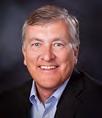
Small injuries incurred on the bikes or scoot ers aren’t currently tracked, but more serious
injuries are. Rijo says the industry overall is trying to collect better data. The license program requires operators to provide safety information. First-time riders are required to click through prompts about not riding on sidewalks, and while helmets aren’t required by law, they are strongly recommended. Rijo says safety messaging will be a big focus this summer.
“Seeing the high ridership is encouraging,” Rijo says. “We’re excited for more trans portation options in the future while we address the challenges.”
In Grand Junction, Community Development Director Tamra Allen says the city is in the process of exploring micro mobility solu tions. She is working with the city council to develop specific regulations in the municipal code that would allow for a micro mobility program. Allen anticipates having a proposal document drafted and released as an RFP for vendors to bid on this summer. The city plans to consider up to three vendors to pilot its program.
Use of downtown Denver’s micro mobility program may be taking off, but residents say safety issues haven’t been adequately addressed, and they ques tion if the programs are doing what they’re actually designed to do: Reduce the numbers of cars on the road.
“Transportation advocates love the scooters and bikes because they think they’re replacing cars with these alternative forms of transit, but there’s a disconnect,” says LoDo resident Mike West, CPA. “They need to walk down the streets and experience what it’s really like.”
West says he observes riders using the alternative modes of transit mostly for joy rides. Data from Colorado Springs bear that out. City transportation officials had hoped local riders would use bikes and scooters to move between the two separate areas of downtown rather than drive, but data show riders stay in one area or the other with average rides under a mile.
The disparate rates of speed among the different transportation modes jockeying for space in close proximity to each other is problematic. Cars and bikes side-by-side on the street. Ebikes, scooters, and pedes trians side-by-side on the sidewalks. “When you walk around LoDo, you absolutely need eyes in the back of your head for fear you’ll be run over,” West asserts. “And when you come to a corner, you stop because if you don’t and someone is coming, it could be ugly. A lot
of thinking needs to occur in how to properly integrate all of these things and not have them be a toy but rather a useful piece of trans portation, which I don’t think they are at this point.”
West’s point is well-demonstrated in the case of Emily Kleinfelter, the safety and regional Vision Zero planner for the Denver Regional Council of Governments who, according to a Westword article, fre quently takes alternative transportation. She has been hit by a car four times while using a bike or scooter. In the article, she said, “My ulti mate demise will probably come at the hands of a car driver, because we are not prioritizing the lives of people outside of a metal box."
West says the Lower Downtown Neighborhood Association (LoDoNA) is addressing the issue of scooters, bikes, and pedestrians and getting some attention for it. He also notes that Denver hasn’t generally taken advantage of technology as other cities have which includes geofencing to slow bikes and scooters down or make them inoperable on sidewalks. Parking continues to be an issue with riders dumping bikes and scooters wherever the ride ends, creating move ment issues for everyone - and especially for someone who might be in a wheelchair.
“There’s this party line that the bike and scooter programs are great, but when you walk around and experience the reality, it makes you wonder what we’re doing,” West says.
CPACharge has made it easy and inexpensive to accept payments via credit card. I’m getting paid faster, and clients are able to pay their bills with no hassles
– Cantor Forensic Accounting, PLLC
Trusted by accounting industry professionals nationwide, CPACharge is a simple, web-based solution that allows you to securely accept client credit and eCheck payments from anywhere.
increase in cash flow with online payments

of consumers prefer to pay electronically

of bills sent online are paid in 24 hours
started with CPACharge today
CPACharge is a registered agent of

Bank, Columbus, Ga., and Fifth Third Bank, N.A., Cincinnati, OH.
customers experienced
increase on average in revenue per firm using
solutions
The CGMA® Finance Leadership Program — your career accelerator

Ready to master the hottest finance, business, technical, people and leadership skills? The CGMA Finance Leadership Program is designed for you. We recognize your expertise and experience as a CPA by giving you a fast track to the world’s most widely held management accounting designation. Level up today at cgma.org/flp.


As businesses continue to navigate the uncharted waters of the COVID-19 pandemic, a cloud of uncertainty still lingers over the horizon. Most would agree that the only thing clear about the foreseeable future is that it won’t resemble the past. If there is one thing that we can be certain about, it’s that we’ve never been more reliant on technology. It is evolving at an unprecedented rate, transforming our profession and continuously expanding opportunities for accounting and finance professionals to deliver value to clients and employers.
The AICPA Certified Information Technology Professional (CITP) cre dential positions you at the forefront of change. The CITP represents the intersection of technology and finance and is granted exclusively to CPAs and recognized equivalents who specialize and demonstrate specific skills, expertise, and experience in areas that include:
• Information security governance and cybersecurity risk management

• Business continuity management and disaster recovery
• Business intelligence, data management, and analytics
• IT governance, risks, and controls
CITPs understand the impact of these areas on financial reporting, positioning them as trusted advisors for clients and employees alike.
Responding to the COVID-19 crisis remains top of mind for clients and employers across the globe. With specialized knowledge in business continuity and disaster recovery, CITP professionals are well suited to guide businesses through crisis management, recovery of operations, and future preparedness.
Moreover, businesses now face an evolving cyber threat landscape due to impacts from the COVID-19 pandemic. It’s now more import ant than ever for businesses to have a robust strategy in place to assess cyber risk, detect threats, and plan for recovery in the event of a breach. Earning the CITP credential illustrates proficiency in assessing, detecting, and managing cyber risk, in a day and age where cyber resilience has never been more critical.
To qualify for the CITP credential, a candidate must:
• Be an AICPA member in good standing
• Hold a valid and unrevoked CPA certificate or license issued by a legally constituted state authority
• Pass the CITP Exam, which is offered year-round, on a contin uous basis, and online with remote proctoring (requirement waived for candidates who have passed ISACA’s Certified Infor mation Systems Auditor (CISA®) certification exam)
• Meet the minimum business experience requirement of 1,000 hours in the CITP body of knowledge within the five-year period preceding the date of the CITP application
Learn more about the CITP credential, its benefits, and the pathway to becoming a CITP credential holder. Start your path toward becom ing a CITP, and register for the CITP Exam today!
Paige A. Curtiss, CPA, was promoted to Tax Supervisor at Dalby, Wendland & Co., PC, Grand Junction.


Seth C. Knighton, was promoted to Tax Supervisor at Dalby, Wendland & Co., PC, Grand Junction.


Rachel M. Schlepp, CPA, was promoted to Principal at Dalby, Wendland & Co., PC, Grand Junction.
Lisa A. Thon-Kollar, CPA, was promoted to Principal at Dalby, Wendland & Co., PC, Grand Junction.



Kelsa D. Tinsley, CPA, was promoted to Principal at Dalby, Wendland & Co., PC, Grand Junction.

Megan S. Loberg, CPA, was promoted to Tax Supervisor at Dalby, Wendland & Co., PC, Glenwood Springs.
Belen Salinas was promoted to Tax Senior at Dalby, Wendland & Co., PC, Glenwood Springs.


Rand L. Gambrell, CPA, was named Managing Director at FORVIS in Denver.


STEVEN W. SAUER, CPA
Steven W. Sauer, CPA, was named Managing Direc tor at FORVIS in Colorado Springs.
Celia Dietrich, CPA (Inactive), Executive Chair and Founder, Dietrich Partners, Denver, was appointed to the Pinnacol Assurance Board of Directors.
Ashley N. Granger, CPA, was named Partner at RubinBrown, LLP, Denver.
Samantha J. Nelson, CPA, was named Partner at RubinBrown, LLP, Denver.

SeonAh Kendall, CPA, was promoted to Economic Health Director for the City of Fort Collins.

Stanley Podolski III, CPA, CIA, CHBME, President, Podolski Advisory Services Limited, Fort Collins, was appointed by Gov. Jared Polis to an additional four-year term with the Colorado Lottery Commission, on which he serves as Vice Chair.
WEDNESDAYS, VIRTUAL ONLY
NOON-1:00 P.M., MT
Wednesday, Oct. 19
Additional 2022 dates: Nov. 16, Dec. 14. For more information, contact Lynn M. Mitton, CPA, MT, MPA, 303-499-7445, or email lmitton@tandemcpas.com.
TUESDAYS, VIRTUAL ONLY
NOON-2:00 P.M., MT
Tuesday, Oct. 25
Additional 2022 date: Dec. 6. Register at www.cocpa.org
We extend our sympathy to the families and friends of the following members of the COCPA:
Charles H. Baggs
Colorado Springs, Colo., Member since 1959
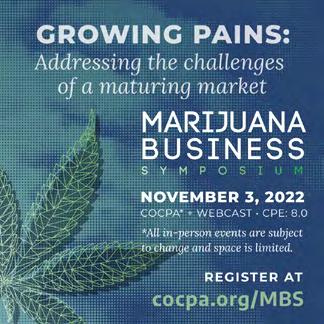
Edwin C. Branson
Grand Junction, Colo., Member since 1992

Jerry A. Luber
Littleton, Colo., Member since 1975
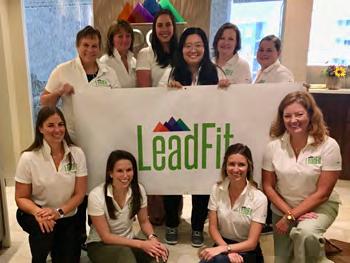
Roy A. Sommers
Greeley, Colo., Member since 1972

Irwin Wagner Denver, Colo., Member since 1963
Delwin Hock
Denver, Colo., Member since 1958

Larry M. Barton
Littleton, Colo., Member since 1971

